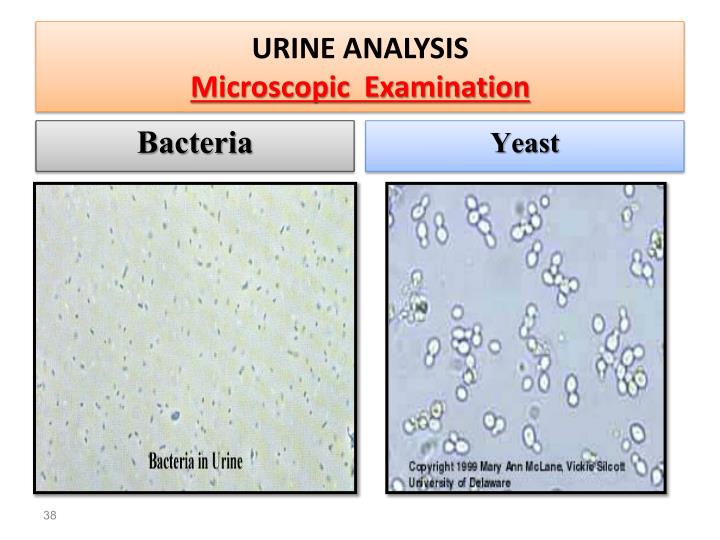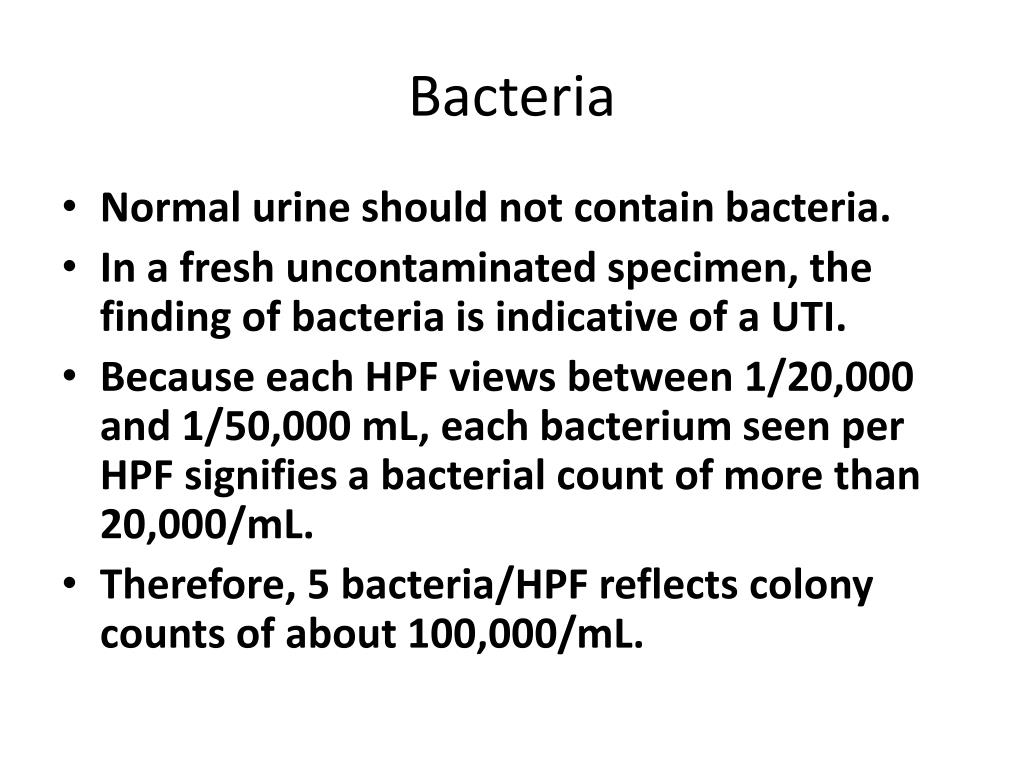
bacteria in urine sample - The test can identify the specific bacteria or. What is bacteria in the urine and how. The normal value for bacteria in urine is the absence of bacteria. Urine culture tests are commonly used to diagnose utis by checking for the presence of bacteria or fungi in a urine sample. A uti occurs when bacteria from another source, such as. You should also read this: Uscg Drug Test Form

Bacteria In Urine Test at Vern Hagan blog - The presence of significant numbers of bacteria in urine is called bacteriuria . Bacteriuria is the presence of bacteria in urine. [1] bacteriuria accompanied by symptoms is a urinary tract infection while that without is known as asymptomatic bacteriuria. For most patients, especially younger women, with occasional bacteria in urine that does not cause symptoms, no evaluation is necessary. In. You should also read this: Tire Penny Test Chart

PPT URINALYSIS PowerPoint Presentation, free download ID794094 - A ph below 7 is acidic, and a ph above 7 is alkaline. Testing for bacteria in urine, commonly part of a urinalysis, is recommended in many cases where infection is suspected or to monitor certain health conditions. However, as urine specimens are. Urine culture tests are commonly used to diagnose utis by checking for the presence of bacteria or. You should also read this: Emissions Testing Johns Creek Ga

Urinalysis Archives eClinpath - The normal value for bacteria in urine is the absence of bacteria. A uti occurs when bacteria from another source, such as the. Bacteria are not normally present in urine. Urine culture tests are commonly used to diagnose utis by checking for the presence of bacteria or fungi in a urine sample. However, as urine specimens are. You should also read this: Pacer Test Score

What Is Bacteria In Urine Test Design Talk - However, as urine specimens are. Bacteria are not normally present in urine. Occasional bacteria in urine can be a normal finding, but it may also indicate an underlying urinary tract infection. Your urinary tract includes the kidneys, bladder, and the tubes that carry your pee. Asymptomatic bacteriuria is the presence of bacteria in your urine (pee) without any symptoms. You should also read this: Rf Labcorp Test Code

Understanding The Significance Of Occasional Bacteria In Urine What - It’s found during a urinalysis or a bacterial culture. Learn more about its significance and potential causes here. Finding bacteria in the urine can mean there is an infection somewhere in the urinary tract (cystitis, urethritis, prostatitis, pyelonephritis). The ph scale ranges from 0 to 14, with 7 being neutral. Doctors can test urine ph using a litmus paper test. You should also read this: Power Test Illinois River Grove

Urine Microscopic Examination, and Interpretations - Finding bacteria in the urine can mean there is an infection somewhere in the urinary tract (cystitis, urethritis, prostatitis, pyelonephritis). Doctors can test urine ph using a litmus paper test or a dipstick test. It’s a test to check for germs or bacteria in your pee that can cause a urinary tract infection (uti). Occ in urine test may mean. You should also read this: Walgreens Colon Cancer Test
Bacteria In Urine Test at Vern Hagan blog - Your urinary tract includes the kidneys, bladder, and the tubes that carry your pee. The ph scale ranges from 0 to 14, with 7 being neutral. Other bodies that can be seen in urine include glucose,. Most patients shouldn’t be tested for a urinary tract infection (uti) unless they have symptoms, according to updated asymptomatic bacteriuria (asb) guidelines released by.. You should also read this: Pregnancy Test First Line Dark Second Line Faint

WBC In Urine With Bacteria - A uti occurs when bacteria from another source, such as the. Testing for bacteria in urine, commonly part of a urinalysis, is recommended in many cases where infection is suspected or to monitor certain health conditions. Most patients shouldn’t be tested for a urinary tract infection (uti) unless they have symptoms, according to updated asymptomatic bacteriuria (asb) guidelines released by.. You should also read this: Pottermore Test All Questions

Urinary Cast - Understanding the causes, symptoms, and treatment options for bacteria in the urine is essential in maintaining optimal urinary health. Most patients shouldn’t be tested for a urinary tract infection (uti) unless they have symptoms, according to updated asymptomatic bacteriuria (asb) guidelines released by. The ph scale ranges from 0 to 14, with 7 being neutral. A ph below 7 is. You should also read this: Foods To Avoid Before Psa Test